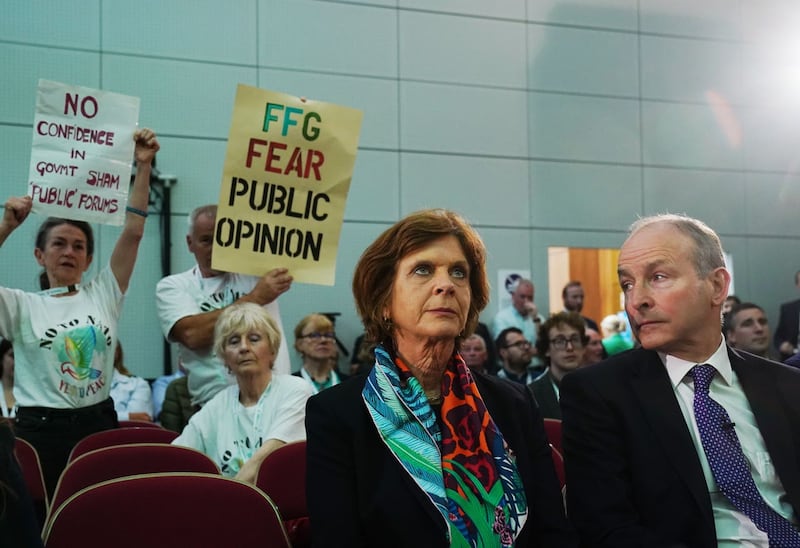Tanaiste Micheal Martin has instructed Department of Defence officials to prepare legislation to remove the UN Security Council’s ability to veto the deployment of Irish troops abroad, in a move described by opposition politicians as an attempt to undermine the state’s neutrality.
The triple-lock system requires approval from the Dail, Government and either the UN Security Council or General Assembly for the deployment of more than 12 defence forces members on overseas operations.
The five permanent members of the UN Security Council – China, France, Russia, the UK and the US – have the power to veto the adoption of any Council resolution.
During a series of statements in the Dail on the report of the Government’s consultative forum on international security policy, Mr Martin said: “In effect, this triple-lock system hands the five permanent Security Council members a veto of our national sovereign decision to provide troops to peacekeeping missions.”

He added: “The implications of this for Ireland and our current policy is simply something we have to take seriously. We cannot just revert to soundbites.
“We have to be honest about the fact that in respect of many of the worst crises internationally, where rapid, impartial and decisive international action is desperately needed, the Council has not been able to act.”
He said Ireland “cannot ignore the systemic challenges” facing the Security Council, adding this was most evident in how difficult it is to agree or renew UN peacekeeping mandates.
“It would therefore make sense, I believe, to amend our existing legislation in a manner which would allow us to respond to crisis situations with more agility and in making these important decisions, we are not surrendering our sovereignty.
“I have therefore instructed officials at the Department of Defence to prepare legislative proposals without delay that would govern the future overseas deployment of our defence forces.
“These could, for example, allow us to deploy personnel to multilateral missions overseas, where these are organised by a regional organisation such as the European Union or African Union or where the host country is requesting such support from the international community.
“While these proposals might not necessarily always include a role for the UN Security Council, they will of course remain fully consistent with the principles of the UN charter and international law.
“By making this change in the future, we would be removing the veto power of the Security Council members over Ireland’s engagement, while safeguarding the essential link with international law and good governance.”

Sinn Fein defence spokesperson Matt Carthy described the proposal as a “fundamental shift in Ireland’s foreign policy” that would “radically undermine Irish neutrality as we know it.”
Mr Carthy said it was evident that the consultative forum was not a genuine exercise in public debate and was rather an attempt by Government to reshape public opinion.
He said: “There is clearly an agenda within Government that seeks to reframe the definition of Irish neutrality and to undermine the principle of Ireland having an independent foreign policy.”
The opposition spokesman accused Mr Martin of repeatedly trying to undermine the triple lock prior to the consultative forum taking place.
“Opponents of Irish neutrality – and we’ve heard this repeatedly during the forum – often claim that it, and particularly the triple lock, leads us beholden to Russia or China.
“But those opponents are not against Ireland being beholden to others when it comes to foreign policy, they simply want to chose who we are beholden to. Irish neutrality means not being beholden to others at all.”
Mr Carthy said there was an argument made at the forum that Russia’s actions in Ukraine determined the need to remove the triple-lock requirement in favour of a common European foreign policy or complete alignment with NATO.
He added: “If anyone had questions about the absolute necessity for Ireland to maintain an independent foreign policy, those questions were answered the day that the President of the European Commission and European Parliament landed in Tel Aviv and gave unequivocal support to Israel as it embarked on its ferocious illegal assault on Gaza.
“That position does not and would never represent the views or the values of the Irish people, and it reinforced the need to ensure that no European office holder can ever speak for Ireland without our direct consent and agreement.”
Mr Carthy, who noted that the triple lock allows for approval from the UN General Assembly rather than the Security Council, said the Tanaiste needed to answer the question of what mission the Irish troops had been prevented from participating in under the current system.








